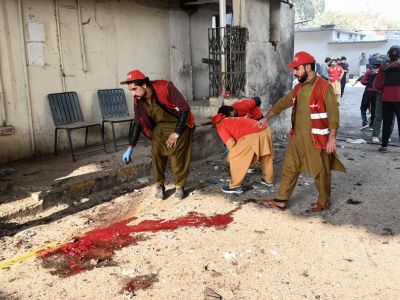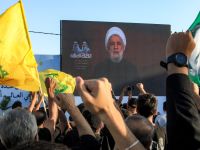The Palestinian Authority said Monday that Israel's assassination of a Popular Front for the Liberation of Palestine (PFLP) leader "opens the door to all-out war," and could plunge the whole region "into a cycle of bloodshed," reported AFP.
The Palestinian leadership declared three days of official mourning after Israeli missiles killed PFLP leader Abu Ali Mustapha in his Ramallah office earlier in the day.
"By this aggression, the Israeli government is opening the door to all-out war without any deterrence or taboos for red lines, and without any consideration of the international community's condemnation" of Israel's assassination policy, the agency quoted PA officials as saying.
The Israeli army confirmed it had killed Mustapha, blaming him for a string of car bombings and shooting attacks against Israelis, including a car bomb placed near the Russian Compound in downtown occupied Jerusalem last week, and a bomb that was hidden in a watermelon and placed on a Jerusalem bus, according to Haaretz.
The Palestinian Authority has accused US President George W. Bush of turning a blind eye the controversial assassination policy, despite official US condemnation, said AFP.
"Israel carried out the assassination with a green light provided by the US administration, through its bias and support for the policy of (Prime Minister Ariel) Sharon and by refusing to send international protection for our people," the PA said.
Palestinian Authority leaders warned that the latest strike would "plunge the whole region into a cycle of bloodshed and violence."
On Monday morning, an Israeli kitchen cabinet meeting grouping Prime Minister Ariel Sharon, Foreign Minister Shimon Peres and Defense Minister Binyamin Ben Eliezer, decided to continue with the killing of Palestinian leaders and Intifada activists.
Mustapha was in his office, near Palestinian President Yasser Arafat's headquarters in the West Bank town, when two missiles from US-made Apache helicopter gunships blasted the building.
A bodyguard of Mustapha told Al Jazeera that one of the projectiles apparently hit the resistance leader in the face, tearing apart his body.
The attack was similar to a previous one in Nablus this month that killed six Palestinians, including two top Hamas leaders, along with two small boys and a reporter.
Mustapha is the highest-ranking Palestinian leader targeted by Israel's ongoing assassination policy.
Known for his guerre de nom Abu Ali Mustapha, Mustapha Zebri, 63, had served as deputy general secretary of the PFLP since the early 1970s and succeeded George Habash as chief of the group in July 2000 after moving to live permanently on Palestinian soil.
The PFLP has been active in the latest Palestinian uprising against 34 years of Israeli occupation, claiming a number of anti-Israeli military operations.
Palestinian officials say that over 40 political leaders and resistance fighters have been killed under Israel's assassination policy, variously called by the euphemisms "targeted killings," "liquidations," "surgical strikes," and "interception operations."
AFP's latest death tally for the Palestinian uprising against 34 years of Israeli military occupation comes out to 13 Arab Israelis, 567 Palestinians, and 146 Israelis, putting the ratio of casualties at around four Palestinians killed for every Israeli loss.
ANGER, GRIEF PREVAILS IN PALESTINE, STRIKE DECLARED
Al Jazeera satellite channel’s correspondent said that a state of grief prevailed in the Palestinian towns and cities. A general strike has been declared in the Palestinian lands for Tuesday.
The attack triggered angry reactions on the Palestinian and Arab side, and calls for restraint by international parties.
Israel has "crossed all red lines" by assassinating the secretary general of the Popular Front for the Liberation of Palestine (PFLP), the top aide to Palestinian President Yasser Arafat, Nabil Abu Rudeina, told AFP Monday.
"This is a dangerous stage in the Israeli aggression; it has crossed all red lines," said Abu Rudeina. "It's a new crime that Israel is committing, exploiting US silence and irresponsible American declarations."
In Damascus, meanwhile, Maher Taher, a member of the PFLP political directorate, said the killing would not go unpunished.
"This crime will not go unpunished, and the PFLP will answer Israel because the blood of Abu Ali Mustapha is very precious. Israel will have to bear the consequences," Taher said.
Taher explained that, as Mustapha did not have a deputy, the central committee and political directorate would meet to choose a successor.
JORDAN CONDEMNS MURDER, WARNS OF ESCALATION
In Amman, meanwhile, Jordanian Information Minister Saleh Qallab condemned the killing as "horrible," warning it would lead to an escalation of violence.
"The Jordanian people and government condemn this treacherous aggression, which enters into the Israeli cycle of escalation against the Palestinian people and leadership," Qallab told AFP in an telephone interview from Saudi Arabia.
"This horrible crime will only lead to further bloodshed and violence in the region," he said.
"Israel must stop this behavior, which is unacceptable on the political and humanitarian levels," said Qallab, who is in Saudi Arabia for a meeting of Arab information ministers to discuss the Middle East crisis.
"Such crimes are led by governments who violate the norms of international law," Qallab said.
"Jordan once again calls on the international community and the superpowers to put real and efficient pressure on Israel to put an end to this uncontrollable violence," the minister said.
He expressed Jordan's condolences to the PFLP and to Arafat over Mustapha's killing and reiterated Amman's commitment to support the Palestinian cause.
Meanwhile, Palestinian refugee camps in Lebanon, the home to some 376,000 displaced Palestinians, were transformed into scenes of mourning for the slain PFLP chief, said AFP.
In the Baddawi and Nahr Al Bared camps in northern Lebanon, Palestinian flags hung at half mast and black banners waved from homes.
Mosque speakers blared prayers of mourning, and portraits of Mustapha were pasted on the buildings of Palestinian political groups.
Abu Ali Hassan, PFLP leader in south Lebanon's Ain Helweh camp, said Mustapha's "disappearance will reinforce the determination of Palestinian fighters to intensify their operations against the Israeli occupation army."
In Syria, all regular broadcasts were interrupted in order to cover Mustapha's killing, said Haaretz.
ARAB MK'S CONDEMN KILLING, ISRAELIS QUESTION IT
Arab members of the Knesset also condemned the killing.
Haaretz quoted MK Ahmed Tibi as calling the act a "war crime."
"War crimes are paid for by bringing to trial those who are behind the criminal deed of assassinating a senior political leader. Sharon, Ben Eliezer and Mofaz are marching together to the entrance of the International Tribunal in the Hague."
The Balad (National Democratic Alliance) Party released a statement condemning the killing. "The man of blood Sharon is making a mistake when he feels that terror acts such as this can be a substitute for a diplomatic plan... Eliminating the Palestinian political leadership only escalates the battle."
Members of the party called for Sharon's immediate resignation and said that Balad activists would hold demonstrations throughout the country.
Some Israeli leaders also questioned the operation. While expressing support for the strike, Transportation Minister Ephraim Sneh criticized the fact that it was carried out without first being discussed by the cabinet.
"In the last few days there is a feeling that cardinal decisions have not been taken in the cabinet," he said. "I'm not even sure that the foreign minister knew of this attack. There is a forum of two who make these decisions, contrary to what was agreed in the coalition agreements."
"Despite this, this man is responsible for seven car bombs...that makes him a legitimate target," Sneh added.
Opposition leader Yossi Sarid from the Meretz Party expressed doubt regarding the wisdom of the strike, said the paper.
"The assasination of a political activist is a dangerous escalation of the situation," he said.
"There was no great intelligence operation here. He was not hiding but was sitting in his office. I would hope that we will not start killing other political leaders in their offices."
ANNAN CALLS FOR TALKS
Meanwhile, UN Secretary General Kofi Annan called on Israelis and Palestinians Monday to resume talks to prevent the latest violent "tragedy" from spreading into a wider crisis, said AFP.
"It is when the killing is going on, in the middle of this tragedy, that you must talk," he told reporters in the Austrian town of Sankt Gilgen, lamenting that the "violence" had reached unprecedented levels.
"I am worried that if we don't contain the crisis it will spread," he said, adding: "So far it has not happened but it cannot be excluded."
Some 567 Palestinians and 146 Israelis have died to date in the latest Palestinian uprising against 34 years of military occupation.
Israel’s wounded number in the high hundreds, according to army sources, while the Palestine Red Crescent Society puts the number of Palestinians injured at over 15,000.
Amnesty International reported early this year that almost 100 Palestinian children had been killed by Israeli soldiers, nearly all in situations where the occupation troops were under no immediate threat – Albawaba.com
© 2001 Al Bawaba (www.albawaba.com)









